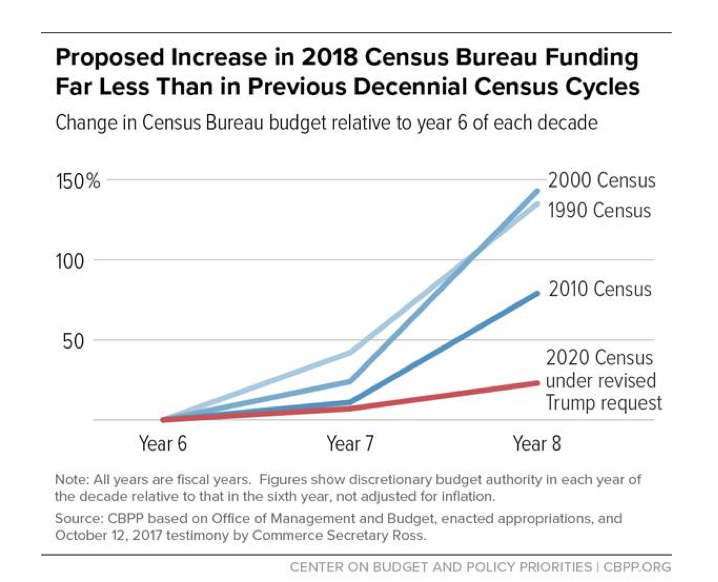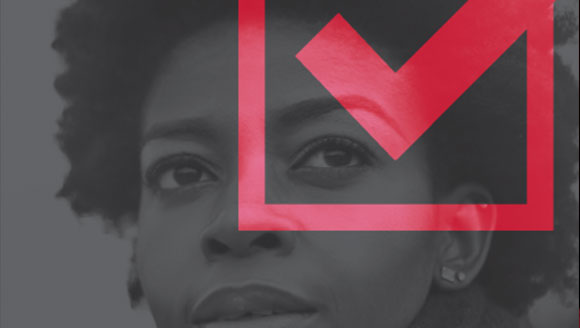The Digital Age Census: Potential and Peril for Black America
 Vanita Gupta
Vanita Gupta
President & CEO, The Leadership Conference on Civil and Human Rights & The Leadership Conference Education Fund
Twitter: @civilrightsorg
Every 10 years, the U.S. Census Bureau undertakes a massive effort to count every person living in the United States. Because African Americans are among the groups of people who have historically been undercounted, and because an undercount can deprive communities of political representation as well as urgently needed resources, achieving a fair and accurate count in the 2020 Census is one of the most important civil rights issues facing Black America. That is why The Leadership Conference Education Fund has been collaborating with a broad network of civil and human rights advocates, policy experts, and service providers to call attention to the importance of the census and to sound an alarm about a potential disaster in the making.
The Constitution requires a complete population count, which plays a major role in the distribution of political power in the United States. The 2020 Census will determine how many seats each state has in the U.S. House of Representatives for the next 10 years. In addition, census data will be used by state and local officials to draw the lines for congressional districts as well as state legislative and local election districts. There’s a lot at stake in having everyone counted.
Census data are also used to monitor compliance with civil rights protections like those in the Voting Rights Act, and to guide their enforcement. After the Supreme Court’s Brown v Board of Education decision, for example, census data helped shape school desegregation efforts. The enforcement of voting rights and other civil rights protections are already at risk in our current political climate. Failure to collect accurate demographic information in the 2020 Census can only make things worse.
The economic well-being of African-American individuals and communities is also at risk because census data are used to steer more than $600 billion every year in federal spending on programs ranging from economic development to housing, education, transportation, and health care. In addition, state and local governments and social service agencies use census data to identify where needs are greatest. Private companies rely on census data to decide where to invest job-creating dollars. Without good data guiding all these decisions, a great deal of money will be wasted over the next 10 years, and many people’s needs will be left unmet.
The new technologies and strategies being put in place for the 2020 Census have the potential to address many challenges to ensuring a more accurate count. The new internet response option could make participation easier than ever before, saving time, money, and paperwork. Targeted digital advertising could help reach hard-to-count communities, including African Americans, Latinos, and younger adults, who rely more on mobile devices for their internet access.
But the new online option will not be a “silver bullet.” We cannot carry out a “digital age” census without addressing the digital divide. According to one study, 78 percent of non-Hispanic Black Americans use the internet, compared with 85 percent of whites and 84 percent of adults overall.
There are also regional differences, with greater access to high-speed internet in the Northeast and West than in the South. We also need to ensure that completing the questionnaire on a smartphone is just as easy as doing so on a laptop or desktop computer. Identifying these problems and designing and testing solutions requires commitment, investment, and time.
These opportunities and risks are examined in-depth in “Counting Everyone in the Digital Age,” a report published by The Leadership Conference Education Fund and the Georgetown Center on Poverty and Inequality.
In theory, maximizing the number of people who participate online will free up more resources to focus “get out the count” efforts on those who do not initially respond. But people in vulnerable communities, especially those who feel targeted by or distrust the government in the current political climate, may not trust the new technologies or may believe that their answers will be used against them or their loved ones. And there are other security considerations; people with less secure internet access are more vulnerable to hackers and malware that might target census operations.
All these potential problems are worsened by a severe crisis of underfunding for the 2020 Census. The Census Bureau spends most of the decade preparing for this massive undertaking. Beginning a few years before the actual count, the bureau needs a steady increase in funding to move from research and testing to planning, development and preparation—and then implementation. However, that has not happened yet for the 2020 Census. Here's a useful comparison:
Click to enlarge image
Congress’ failure to pass appropriations bills on time for Fiscal Years 2017 and 2018, and the Trump administration’s woefully inadequate original funding request for FY 2018, has added significant risk to census preparations. This means that when the Census Bureau conducts this year’s crucial “dress rehearsal,” which is the only integrated evaluation of all operations and IT systems before the 2020 Census, it will be hundreds of millions of dollars short of what it needs to rigorously test the new IT infrastructure. Moreover, the bureau has lowered the projected online response rate for the 2020 Census to 41 percent. The inaction of our elected officials to adequately fund census preparations could lead to an expensive and damaging disaster, one whose impact would almost certainly fall hardest on the most vulnerable communities, including African Americans.
These critical, time-sensitive census funding and planning issues must be addressed now to ensure a fair and accurate census in 2020. The Leadership Conference is working with the National Urban League, the NAACP and our other coalition partners to ensure that no one is left out of the 2020 Census. Together, we are mobilizing and engaging the civil and human rights coalition on critical, time-sensitive issues now to ensure that the Census Bureau has the resources it needs. We have a once in a decade chance to get it right, and we will live with the consequences for years to come.



 Equality Index
Equality Index  Senate Report
Senate Report  2020 SOBA Essays
2020 SOBA Essays  2019 Report
2019 Report 